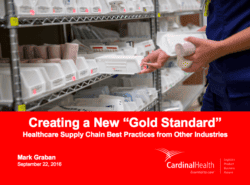 I'm excited to announce that I'm presenting a webinar at no cost to you on September 22nd, sponsored by Cardinal Health and hosted by FierceHealthcare.com:
I'm excited to announce that I'm presenting a webinar at no cost to you on September 22nd, sponsored by Cardinal Health and hosted by FierceHealthcare.com:
Creating a New “Gold Standard” – Healthcare Supply Chain Best Practices from Other Industries
Update: Here is the recording:
In the webinar, I'll talk about practices and lessons learned from manufacturers like Toyota and Dell, as well as leading retailers. Lean offers many methods and mindsets for materials management at a local level (in a factory or a hospital) and across the broader supply chain.
Hospitals aren't factories, but there are practical lessons we can learn from them.
You might think the primary goal of a manufacturer, yet alone a “Lean manufacturer” is to have low inventory. As I learned, in my ways working in manufacturing, the first goal is to meet your customer's needs… and to do so with the lowest inventory level. And, we work to reduce those inventory levels over time by solving the problems that lead to us otherwise needing to hold MORE inventory. “Zero inventories” is never achieved, even at Toyota, and we might cause many problems by trying to cut costs in a hospital by driving inventories too low. We have to look at operational needs and capabilities and not just look at things from a financial perspective.
When I first got into healthcare, I was surprised to see that many of the supply chain practices were sort of old fashioned. There was a practice, still used today in some hospitals, that didn't make sense to me… somebody had to explain it to me three times the first time I heard of it… the “par level” system. You mean somebody comes through and counts all of the items on these shelves every day or every week? What waste? I've worked with many hospitals to replace the “waste of counting” with simple kanban systems that make the process of pulling new materials more visual, more simple, and more effective.
Is there a role for technology in kanban systems and other Lean supply chain methods? Of course. But, in keeping with Lean and TPS principles, we “Use only reliable, thoroughly-tested technology that serves your people and process.” For example, instead of physically sending an empty kanban bin to a central supply area, we can scan a bar code or use an RFID chip and reader to send a signal when a nurse removes a bin from a rack. We just don't expect technology to be an easy “silver bullet” solution (as W. Edwards Deming said, there is no instant pudding).
Effective Lean materials systems can free up staff time, allowing them to provide better patient care. The best Lean supply chains make sure that frontline staff always have what they need to provide patient care, making those material convenient and easy to access. Lean systems take the materials management burden off of healthcare professionals, as the materials or supply chain group focuses on serving those who serve patients.
Hospital supply chains are complex, to be sure. There's a lot of waste, but that means there is a lot of opportunity. It can be hard to predict the need for certain supplies – but that's true in manufacturing too and Lean still helps. Healthcare is often a matter of life and death, so that's all the more reason to work toward creating world-class supply chains. It's not just about inventory turns and the bottom line… it's about the patients and those who care for them.
If you work in healthcare, do you have any stories or examples of using materials or supply chain management practices from other industries? Leave a comment and share your story below…
Disclosure: This webinar and post is sponsored by Cardinal Health. I received compensation from Cardinal Health for participating in this educational program.
What do you think? Please scroll down (or click) to post a comment. Or please share the post with your thoughts on LinkedIn – and follow me or connect with me there.
Did you like this post? Make sure you don't miss a post or podcast — Subscribe to get notified about posts via email daily or weekly.
Check out my latest book, The Mistakes That Make Us: Cultivating a Culture of Learning and Innovation:









Here’s a good article that talks about the impact of supply chain and materials, from the WSJ:
Nurses Shift, Aiming for More Time With Patients
Hospitals Hope Extra Face Time and Personal Attention Will Help Make Recovery Easier
Nurse time at the bedside went from 2.5 hours per shift to 6.5 hours, thanks to better supply chain practices and other factors.
One small community hospital saved $2.5 million through better materials management (Simpler Consulting helped them).
Great quote:
Comment from LinkedIn:
[…] — As I blogged about before, I’m doing a webinar on Thursday, sponsored by Cardinal Health, on Lean and healthcare supply […]
[…] again to Cardinal Health for sponsoring the webinar that I did with them and Fierce Healthcare on supply chain best practices from other […]